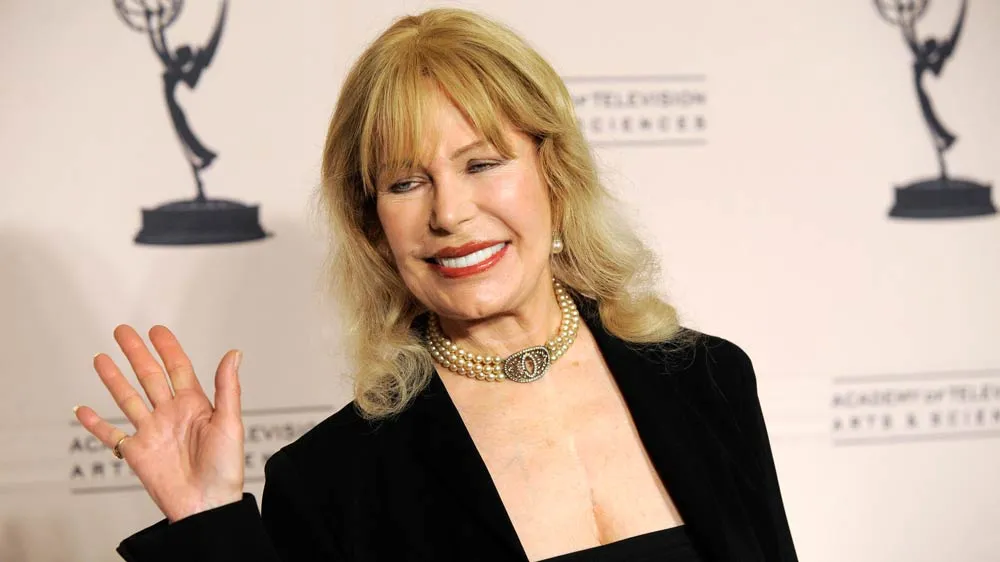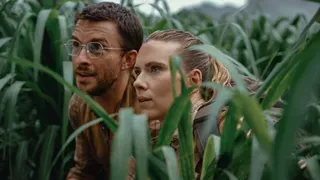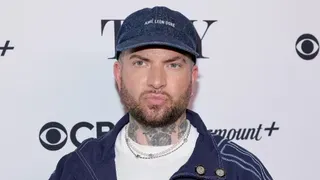June 28, 2017
TV, Films Turning to Young Girls for Their New Action Stars
Sandy Cohen READ TIME: 8 MIN.
From the murderous Laura in "Logan" to the mysterious Eleven in "Stranger Things" to the audacious determination of Mija in "Okja," opening Wednesday, powerful young girls are starring in mainstream action fare like never before.
Though Nancy Drew was solving mysteries in the 1930s and Buffy slayed vampires all through high school in the late 1990s, young girls are rarely shown as heroes in programs aimed at general audiences, said Mary Celeste Kearney, director of gender studies and a professor of film, television and theater at University of Notre Dame.
"Girls have seen these figures... but when they've looked to mainstream stuff and what their brothers and their dads and boys are watching, those girls are never there," Kearney said. "And now they are, and that's huge."
It means girls don't have to look to grown up heroes like Katniss Everdeen in "The Hunger Games" or Rey in "Star Wars: The Force Awakens." Like 10-year-old Elliot on the flying bicycle in "E.T. the Extraterrestrial," now girls are having awesome genre adventures as powerful young kids onscreen.
The Duffer Brothers said gender was never a question when it came to creating the super-powered star character in their Netflix series "Stranger Things." Eleven, played by 13-year-old Millie Bobby Brown, can move things with her mind and is the fascinating secret friend of a group of pre-teen boys in the fictional town of Hawkins, Indiana.
"Eleven was always a girl. I don't even remember when or why we made that decision except that was always the case," Matt Duffer said in a recent interview. "Eleven was the centerpiece of the show for us always and was always going to be this girl who escaped the lab... I think we liked the idea because it wasn't something we had seen before."
A second little girl is joining the cast for the show's second season, which premieres Oct. 31.
Writer-director Bong Joon Ho intentionally made his central human character a girl in "Okja," an international adventure film named for the genetically engineered six-ton "super pig" at its heart.
"In cartoons or movies, young girls are often portrayed as characters that need to be protected or rescued. I wanted to do the opposite," the filmmaker said in an email. "I liked that a young female character was the unstoppable guardian of a creature, and that she had to charge and break through all obstacles that stood in her way. I liked this feeling."
Played by 13-year-old An Seo Hyun, Mija has grown up with Okja, and risks everything to protect the massive creature when the corporation that sponsored the super-pig program comes to claim its product.
One thing that's missing from "Okja" and the other projects is a stereotypical little girl who needs saving.
"Logan" writer-director James Mangold can't take credit for creating the young female mutant Laura - he mined the character from "X-Men" history. But Mangold cast an exceptional actress, 11-year-old Dafne Keen, and successfully brought a killer female character to the ultra-male world of big-screen superheroes.
He chose to make Laura a child rather than the teenager she is in the comics because of the bond it would allow with Hugh Jackman's character and the shock it might elicit when Laura draws her claws.
Like Hit-Girl in 2010's "Kick-Ass," Laura is a character created in her father's image. She's Wolverine's daughter and has just as much flesh-shredding power as her dad.
"I did think the shocking nature of Laura's ability to kill savagely would be all the more shocking, in a really wonderful way, that it was a girl and not a boy, that that lethalness would be exhibited by this little girl," Mangold said. "I wondered whether we could pull it off, whether the audience would truly believe this level of violence and intensity trapped inside an 11-year-old body. To me that made it even more exciting to put it on the screen."
Mangold said he took care with Laura's character, who's mute for the first half of the film and speaks only Spanish in the second, to "undermine the kind of cute factor of what this young woman would be and allow her to exist as her own unique character."
It's notable, too, that these young heroines are not all embodied by white actresses.
Kearney says it's more than just the "Wonder Woman" effect inspiring these empowered characters: "History has everything to do with this and the gender politics of different historical moments."
The powerful women and girls onscreen reflect more progressive gender attitudes, she said, adding that some writers and producers may have been inspired to create such heroes out of a desire to see more real-life female leaders.
She noted the recent crop of characters all exist in "fantasy narratives," where people can have super powers.
"It's not in our reality; it's in some other reality, and that's really disheartening if you think about it in that way," she said. "Like girls are great as action heroes, but not as president of the United States, not in real life."
Consider that "Billy Elliott," the charming, realistic 2000 independent film about an 11-year-old boy who learns about gender and identity through dance, became a sleeper hit that was adapted for the stage. "The Fits," a similarly realistic, 2016 indie film about an 11-year-old girl who does the same, didn't get the same reception.
Girl action heroes are a start, though, especially ones with mass-market appeal.
"They have a powerful, powerful cultural impact," Kearney said, "which is girls seeing these things and boys seeing girls do these things.... A boy can't go and see 'Logan' and not see a girl as powerful as Logan."
The Duffer Brothers note that Eleven is the show's most popular character and best-selling action figure. Mangold said that when his pre-teen sons visited the set during the making of "Logan," they were more interested in Laura than Wolverine himself.
"They were completely mesmerized by her," he said. "It's really refreshing for everyone to see a kid, especially a young girl, who's not a kewpie doll first or a dimpled smile first, you know? That what's really going on there is someone in conflict, someone who's searching for something, someone who's capable - someone also, by the way, in my film who ends up offering pretty intense advice and wisdom and stability."
___
Follow AP Entertainment Writer Sandy Cohen at www.twitter.com/APSandy.
From the murderous Laura in "Logan" to the mysterious Eleven in "Stranger Things" to the audacious determination of Mija in "Okja," opening Wednesday, powerful young girls are starring in mainstream action fare like never before.
Though Nancy Drew was solving mysteries in the 1930s and Buffy slayed vampires all through high school in the late 1990s, young girls are rarely shown as heroes in programs aimed at general audiences, said Mary Celeste Kearney, director of gender studies and a professor of film, television and theater at University of Notre Dame.
"Girls have seen these figures... but when they've looked to mainstream stuff and what their brothers and their dads and boys are watching, those girls are never there," Kearney said. "And now they are, and that's huge."
It means girls don't have to look to grown up heroes like Katniss Everdeen in "The Hunger Games" or Rey in "Star Wars: The Force Awakens." Like 10-year-old Elliot on the flying bicycle in "E.T. the Extraterrestrial," now girls are having awesome genre adventures as powerful young kids onscreen.
The Duffer Brothers said gender was never a question when it came to creating the super-powered star character in their Netflix series "Stranger Things." Eleven, played by 13-year-old Millie Bobby Brown, can move things with her mind and is the fascinating secret friend of a group of pre-teen boys in the fictional town of Hawkins, Indiana.
"Eleven was always a girl. I don't even remember when or why we made that decision except that was always the case," Matt Duffer said in a recent interview. "Eleven was the centerpiece of the show for us always and was always going to be this girl who escaped the lab... I think we liked the idea because it wasn't something we had seen before."
A second little girl is joining the cast for the show's second season, which premieres Oct. 31.
Writer-director Bong Joon Ho intentionally made his central human character a girl in "Okja," an international adventure film named for the genetically engineered six-ton "super pig" at its heart.
"In cartoons or movies, young girls are often portrayed as characters that need to be protected or rescued. I wanted to do the opposite," the filmmaker said in an email. "I liked that a young female character was the unstoppable guardian of a creature, and that she had to charge and break through all obstacles that stood in her way. I liked this feeling."
Played by 13-year-old An Seo Hyun, Mija has grown up with Okja, and risks everything to protect the massive creature when the corporation that sponsored the super-pig program comes to claim its product.
One thing that's missing from "Okja" and the other projects is a stereotypical little girl who needs saving.
"Logan" writer-director James Mangold can't take credit for creating the young female mutant Laura - he mined the character from "X-Men" history. But Mangold cast an exceptional actress, 11-year-old Dafne Keen, and successfully brought a killer female character to the ultra-male world of big-screen superheroes.
He chose to make Laura a child rather than the teenager she is in the comics because of the bond it would allow with Hugh Jackman's character and the shock it might elicit when Laura draws her claws.
Like Hit-Girl in 2010's "Kick-Ass," Laura is a character created in her father's image. She's Wolverine's daughter and has just as much flesh-shredding power as her dad.
"I did think the shocking nature of Laura's ability to kill savagely would be all the more shocking, in a really wonderful way, that it was a girl and not a boy, that that lethalness would be exhibited by this little girl," Mangold said. "I wondered whether we could pull it off, whether the audience would truly believe this level of violence and intensity trapped inside an 11-year-old body. To me that made it even more exciting to put it on the screen."
Mangold said he took care with Laura's character, who's mute for the first half of the film and speaks only Spanish in the second, to "undermine the kind of cute factor of what this young woman would be and allow her to exist as her own unique character."
It's notable, too, that these young heroines are not all embodied by white actresses.
Kearney says it's more than just the "Wonder Woman" effect inspiring these empowered characters: "History has everything to do with this and the gender politics of different historical moments."
The powerful women and girls onscreen reflect more progressive gender attitudes, she said, adding that some writers and producers may have been inspired to create such heroes out of a desire to see more real-life female leaders.
She noted the recent crop of characters all exist in "fantasy narratives," where people can have super powers.
"It's not in our reality; it's in some other reality, and that's really disheartening if you think about it in that way," she said. "Like girls are great as action heroes, but not as president of the United States, not in real life."
Consider that "Billy Elliott," the charming, realistic 2000 independent film about an 11-year-old boy who learns about gender and identity through dance, became a sleeper hit that was adapted for the stage. "The Fits," a similarly realistic, 2016 indie film about an 11-year-old girl who does the same, didn't get the same reception.
Girl action heroes are a start, though, especially ones with mass-market appeal.
"They have a powerful, powerful cultural impact," Kearney said, "which is girls seeing these things and boys seeing girls do these things.... A boy can't go and see 'Logan' and not see a girl as powerful as Logan."
The Duffer Brothers note that Eleven is the show's most popular character and best-selling action figure. Mangold said that when his pre-teen sons visited the set during the making of "Logan," they were more interested in Laura than Wolverine himself.
"They were completely mesmerized by her," he said. "It's really refreshing for everyone to see a kid, especially a young girl, who's not a kewpie doll first or a dimpled smile first, you know? That what's really going on there is someone in conflict, someone who's searching for something, someone who's capable - someone also, by the way, in my film who ends up offering pretty intense advice and wisdom and stability."







